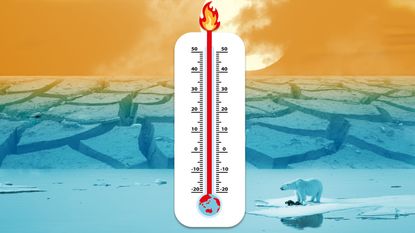The biggest climate records hit this year
The sheer number of climate records made in 2023 presents a harrowing warning of the destructiveness of climate change


The effects of climate change are making themselves known as this year hits new records of uncertainty. And these records are just the beginning if humanity doesn't change course.
1. Hottest month on record
This year saw a sweltering summer, with July 2023 being declared the hottest month on record, according to the Copernicus Climate Change Service (C3S). The month's average temperature was 62.51 degrees Fahrenheit, six-tenths of a degree higher than the previous record set in 2019, The Associated Press reported.
"These records have dire consequences for both people and the planet exposed to ever more frequent and intense extreme events," Copernicus Deputy Director Samantha Burgess told AP. The high temperatures are a combination of anthropogenic climate change as well as the El Niño weather phenomenon. "July's record is unlikely to remain isolated this year," as "temperatures are likely to be well above average," said C3S Director Carlo Buontempo.
Subscribe to The Week
Escape your echo chamber. Get the facts behind the news, plus analysis from multiple perspectives.

Sign up for The Week's Free Newsletters
From our morning news briefing to a weekly Good News Newsletter, get the best of The Week delivered directly to your inbox.
From our morning news briefing to a weekly Good News Newsletter, get the best of The Week delivered directly to your inbox.
"The need to reduce greenhouse gas emissions is more urgent than ever before," Petteri Taalas, a professor and the secretary-general of the World Meteorological Organization, said in a statement. "Climate action is not a luxury but a must."
2. Hottest ocean temperatures
Climate change has also caused unprecedented ocean warming. Along with global air temperatures, water temperatures also hit a record high, almost reaching 100 degrees Fahrenheit in some locations. In the Florida Keys, the water temperature hit 101 degrees Fahrenheit, which could potentially be a new world record, The New York Times reported.
However, scientists expect that the record will likely be broken again. "The fact that we've seen the record now makes me nervous about how much warmer the ocean may get between now and next March," Copernicus' Burgess told BBC. This is because oceans absorb more heat than land does. "The more we burn fossil fuels, the more excess heat will be taken out by the oceans, which means the longer it will take to stabilize them and get them back to where they were."
The water heat is wreaking havoc on marine ecosystems, including coral reefs. "There is widespread coral bleaching at shallow reefs in Florida, and many corals have already died," Dr. Kathryn Lesneski of the National Oceanic and Atmospheric Administration told BBC. The ocean is the "most accurate thermometer we have for the actual effect of climate change because it's where most of the heat ends up," Zeke Hausfather, a climate scientist at nonprofit research institute Berkeley Earth, told the Times.
3. Lowest Antarctic ice cover
Winter in the Southern Hemisphere is when Antarctic ice is supposed to form. However, this year "growth has been stunted," and the amount of sea ice in the region is "hitting a record low by a wide margin," per The New York Times. "The Antarctic sea ice extent low in 2023 is unprecedented in the satellite record," Liping Zhang, a project scientist at the NOAA's Geophysical Fluid Dynamics Laboratory, wrote in an email to the Times.
The previous record low was from 2022, but this year the ice level is approximately 1.6 million square kilometers below last year, CNN reported. "The Antarctic system has always been highly variable," Ted Scambos, a glaciologist at the University of Colorado Boulder, told CNN. "This [current] level of variation, though, is so extreme that something radical has changed in the past two years, but especially this year, relative to all previous years going back at least 45 years."
The warmer ocean temperatures are likely mixing into Antarctic waters, preventing ice from forming. Melting ice is a key factor in sea level rise. Ice also serves to reflect back sunlight, helping to regulate global temperatures.
4. Passing 2-degree warming
The United Nations has consistently warned of the dangers of temperatures rising 1.5 degrees Celsius above pre-industrial levels. However, we finally saw a real taste of this temperature. On Nov. 17, the planet briefly exceeded two degrees Celsius of warming, the upper maximum of warming cautioned by experts. While exceeding these temperatures by just one day doesn't mean that all is lost, "it's a striking reminder that the climate is moving into uncharted territory," The Washington Post.
Passing the threshold indicates a shifting baseline. "Our best estimate is that this was the first day when global temperature was more than 2°C above 1850-1900 (or pre-industrial) levels, at 2.06°C," Samantha Burgess, deputy director of the Copernicus Climate Change Service, wrote on X, formerly known as Twitter. The breach acts as a "canary in the coal mine," Richard Allan, professor of climate science at the University of Reading, told CNN. It is "entirely expected that single days will surpass 2 degrees above pre-industrial well before the actual 2 degrees Celsius target is breached over many years."
The temperature is testing the limits of ecosystems and infrastructure alike, putting pressure on power grids and making some regions deadly without access to air conditioners. “Global temperature records are being broken with alarming regularity,” Carlo Buontempo, the director of the Copernicus Climate Change Service, told The Atlantic. Curbing warming is critical. Greenhouse gas emissions continue to rise every year and further warming is pushing the planet to several tipping points.

Continue reading for free
We hope you're enjoying The Week's refreshingly open-minded journalism.
Subscribed to The Week? Register your account with the same email as your subscription.
Sign up to our 10 Things You Need to Know Today newsletter
A free daily digest of the biggest news stories of the day - and the best features from our website
Devika Rao has worked as a staff writer at The Week since 2022, covering science, the environment, climate and business. She previously worked as a policy associate for a nonprofit organization advocating for environmental action from a business perspective.
-
 5 hilarious cartoons about the George Santos expulsion vote
5 hilarious cartoons about the George Santos expulsion voteCartoons Artists take on Santa versus Santos, his X account, and more
By The Week US Published
-
 Places that are already seeing a boost in tourism due to climate change
Places that are already seeing a boost in tourism due to climate changeThe Explainer Warmer temperatures are moving travelers north
By Devika Rao, The Week US Published
-
 6 snow-or-sun hotels to visit this winter
6 snow-or-sun hotels to visit this winterThe Week Recommends Make your winter dreams a reality at these properties
By Catherine Garcia, The Week US Published
-
 The extreme weather events of 2023
The extreme weather events of 2023In Depth Extreme weather events are becoming more common thanks to climate change, and are 'affecting every corner of the world'
By Devika Rao, The Week US Published
-
 The most and least environmentally friendly countries of 2023
The most and least environmentally friendly countries of 2023In Depth Which nations are making strides, and which are missing the mark?
By Devika Rao, The Week US Published
-
 12 recent scientific breakthroughs
12 recent scientific breakthroughsIn Depth From photos of the infant universe to an energy advancement that could save the planet
By Devika Rao, The Week US Published
-
 What is NASA working on?
What is NASA working on?In Depth A running list of the space agency's most exciting developments
By Devika Rao, The Week US Published
-
 Cigarette-style warning labels on meat could cut consumption, say scientists
Cigarette-style warning labels on meat could cut consumption, say scientistsSpeed Read The UK's national food strategy aims to cut meat consumption by 30% by 2032
By Sorcha Bradley, The Week UK Published
-
 The invasion of the Asian hornet
The invasion of the Asian hornetThe Explainer A newly arrived predator from the East poses a threat to British insects
By The Week UK Published
-
 Humans are polluting the upper atmosphere with flaming space junk
Humans are polluting the upper atmosphere with flaming space junkSpeed Read Experts are still unsure of the effects
By Devika Rao, The Week US Published
-
 Why scientists think orcas may be getting smarter
Why scientists think orcas may be getting smarterUnder the Radar Changing ocean conditions may be forcing killer whales to learn new survival skills
By The Week Staff Published










